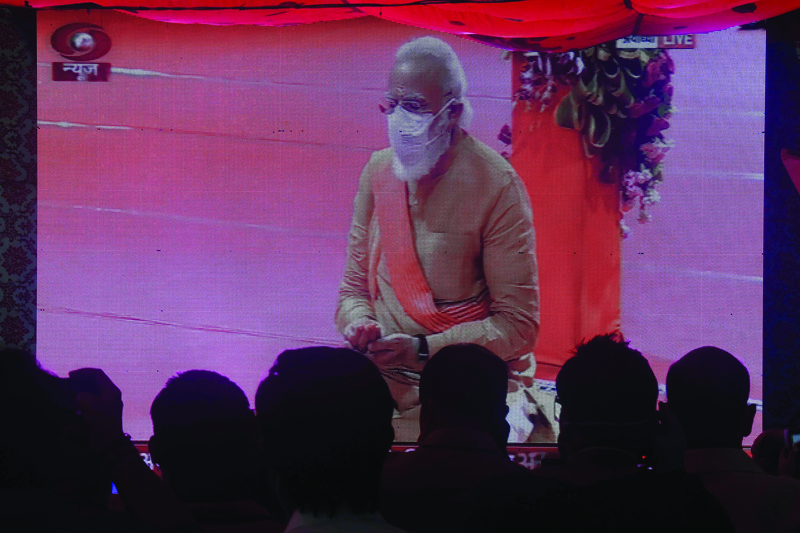
AYODHYA, India: Indian Prime Minister Narendra Modi took center stage yesterday at a ceremony laying the foundations for a temple at a flashpoint holy site exactly a year after imposing direct rule on Muslim-majority Kashmir - twin triumphs for his Hindu nationalist government. The site at Ayodhya, and divided Kashmir, have been two of the most divisive communal issues of the past 30 years in India, and Modi has attempted to draw a line under both.
For his fans, both steps confirm Modi - elected to a second-straight term in a landslide last year - as a decisive, visionary and heroic leader, and India's most important in decades. His critics see him as remolding the officially secular country of 1.3 billion as a Hindu nation at the expense of India's 200 million Muslims, and taking it an authoritarian direction.
"Modi has certainly been India's most transformative leader in recent memory," Micheal Kugelman, from the Wilson Center, told AFP, making him "wildly popular, but also highly controversial and quite divisive". The holy city of Ayodhya in northern India has long been a religious tinderbox, providing the spark for some of its worst sectarian violence. In 1992, a Hindu mob destroyed a centuries-old mosque there that they believed had been built on the birthplace of Ram, an important deity. This triggered religious riots that killed 2,000 people, most of them Muslims.
A lengthy legal battle ensued, but in November - in a major victory for Modi's BJP party - India's top court awarded the site to Hindus, allowing a temple "touching the sky" to be built. Yesterday's elaborate religious ceremony was shown live on television and was reportedly set to be beamed in Times Square in New York. Small celebrations also took place across India.
A masked Modi, 69, shared the stage with the head of the RSS, the militaristic hardline Hindu group that is parent to the BJP and which Modi joined as a young man. "Not only mankind, but the entire universe, all the birds and animals, are enthralled by this golden moment," chanted the main priest. "(Modi) is going to make his position permanently in history purely on the strength of this temple," his biographer Nilanjan Mukhopadhyay told AFP.
Further cementing Modi's place in his country's annals is Kashmir, divided between India and Pakistan since 1947 and the spark for two wars and the source of much bloodshed. The BJP had long seen the special status enjoyed by the part of Kashmir controlled by India as a historical wrong, and on August 5 last year, Modi abolished it. An accompanying security operation turned the region into a fortress for weeks, with all telecommunications cut and thousands taken into custody.
Even now, India has "maintained stifling restraints on Kashmiris in violation of their basic rights", according to Human Rights Watch. People from outside Kashmir are now being granted the right to buy land for the first time. This has ignited fears that Modi wants to change Kashmir's demographic makeup with an Israel-style "settler" project.
Fearing protests ahead of the anniversary, on Tuesday thousands of Indian troops imposed a tight curfew in Kashmir. The streets were all but deserted the following morning. In Pakistan-administered Kashmir, Prime Minister Imran Khan - who on Tuesday released a new map showing all of Kashmir as part of Pakistan - was due to lead a protest march. "We will never accept, and neither will the Kashmiris, the illegal Indian actions and oppression of the Kashmiri people," said Khan in a statement released yesterday.
Other actions have also alarmed Modi's critics and delighted his fans. Last year, a new law made it easier for millions of illegal immigrants from three neighboring countries to get citizenship - but not if they are Muslims. More may be in the pipeline, including a mooted nationwide register obliging people to prove they are Indian, and a uniform civil code doing away with Islamic rules in areas such as marriage. "Clearly, it's full speed ahead with the Hindu nationalist agenda," Kugelman said. - AFP
.jpg)
